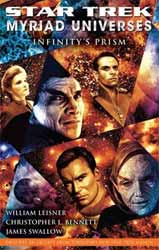|
Click here to return to the main site. Book Review
It is often postulated that every decision creates a nexus, a turning point in the universe, where possible futures split one from another. What if we could see into the future, would we change our minds? In the Star Trek universe there have been many such turning points, where a different choice would have created a new and intriguing outcome. Here, collected into one book, are three of those possibilities... Star Trek: Myriad Universes: Infinity’s Prism is a collection of three stories of the 'what if...' variety, from three different, but equally respected, Trek writers. With such a free rein over content I had high hopes for this series; after all, no longer would we have to suffer the small universe syndrome, or be expected to accept that Starfleet appears to have one ship, at a time, to deal with threats of galactic proportions. The stories are not interconnected, so this is more in the way of an anthology of stories which have the great gift of being able to ignore Trek canon. So, how did they do? A Less Perfect Union by William Leisner is set in the aftermath of the Enterprise series, somewhere before what would have been the Original Series, which allows Leisner to use characters from both. This is a different history with the Enterprise under the command of Captain Pike with a young James Kirk acting as his ‘Number One’. The divergence in this story is that the attack on earth by the separatist faction Terra Prime partially succeeded, making Earth a more wary inward looking society. Now, however, the president feels it is time to reach out, once again to the surrounding civilisations, which have already formed their own federation. To bridge the expanse between humans and their neighbours he turns to T’Pol, who has remained on Earth, even in the face of growing racism. This story has much strength, not least of which is Leisner’s willingness to play around with some sacred characters. So we see James Kirk, not as the morally righteous captain, but as a hot headed, xenophobic first officer. Many of the other characters make an appearance, but in the end this it T’Pol’s story, who over the years has grown in wisdom and sorrow. The story is well written if ultimately a little conservative in how much it wants to bend the audience’s expectations. Places of Exile by Christopher L. Bennett is a Voyager story, whose divergence is much more straight forward, in that their alliance with the Borg Collective against the treat of species 8472 never happened, rather the ship is damaged to a point where returning home becomes an impossibility and the crew must face integrating with another society. Here Bennett has taken full licence with his ability to play with characters, killing off some and having others diverge significantly from their on screen personas. One of the really nice things about the story is the inclusion of Kes, who in this other timeline is given the opportunity to fully develop the powers which were only hinted at in the series. Bennett also gives a cheeky nod to the fact that this is a different time line by having one of the characters acknowledge the events in the show. I’m not as sure about the ending of the story as it seemed a little too much like the feel good Trekkie philosophy which often pervaded the show. You’ll have to read the story to make your own mind up. Last, and very much not least, is the best of the three stories Seeds of Dissent by James Swallow. Here were in Deep Space Nine territory, but not as you would recognise it. The divergence here is that Khan did not flee Earth but in fact won his war and with his race of augmented humans had gone on to dominate his galactic neighbours. Now, many years in the future, the Defiance, under command of the augment Princeps Julian Bashir, stumbles upon The Botany Bay carrying its cargo of sleepers who fled Earth at the time of Khan's conquest. Swallow chose his main character of Bashir well for this story, not least because there was already an air of arrogance to the character which was tempered by his allegiance to his friends and Starfleet. His portrayal of a man confident in his superiority who has all that he believes challenged is one of the better character journeys in the book, both well written and wholly believable. Swallow throws in a couple of other characters from the show, but makes the correct choice of having the main action play out between Bashir and the Botany Bay survivors. So a good start to the series. Whilst some of the stories are better than others, all are well written, with a little something for everybody. 8 Charles Packer Buy this item online |
|---|


